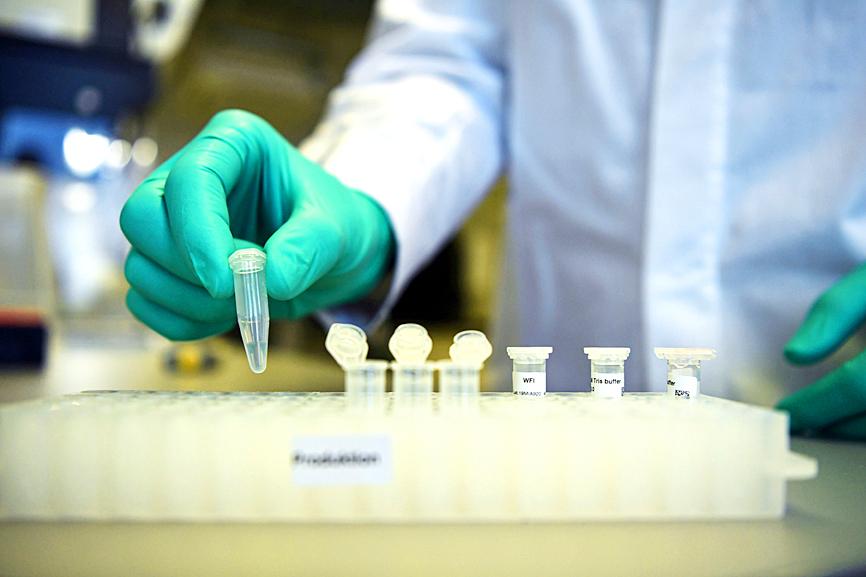German biotech firm CureVac AG has agreed to an alliance with drugmaker Bayer AG to help it seek regulatory approval for its experimental COVID-19 vaccine and distribute doses, the two companies said yesterday.
“Bayer will contribute its expertise and established infrastructure in areas such as clinical operations, regulatory affairs, pharmacovigilance, medical information, supply chain performance as well as support in selected countries,” they said.
Financial terms were not disclosed.

Photo: Reuters
CureVac, which had said it was looking for a larger partner, last month started a late-stage clinical trial of its COVID-19 vaccine candidate, banking on the same technology that has allowed rivals BioNTech and Moderna to lead the development race.
The tie-up echoes a similar deal by German peer BioNTech SE, also a research-focused biotech firm, which last year agreed to collaborate with global pharma giant Pfizer Inc on its vaccine, which is now being rolled out globally.
CureVac, which is listed on the NASDAQ, and backed by investors Dietmar Hopp, the Gates Foundation, GlaxoSmithKline PLC and the German government, has said that it aims to produce up to 300 million doses of the vaccine this year and up to 600 million next year.
In March last year, CureVac was at the center of a row over alleged attempts by US President Donald Trump to gain access to the vaccine, but the company denied at the time having received any US offers for the company or its assets.
As it awaits regulatory approval, the EU has secured up to 405 million doses of the immunization, among a slew of supply deals agreed between the bloc and other vaccine developers.
Bayer’s pharma unit, which is trying to build a new cell and gene therapy business, has expertise in cancer, hemophilia, multiple sclerosis, cardiovascular diseases and women’s health, but not in vaccines.
The group’s stock has been battered by writedowns at its agriculture division, litigation woes and a bleaker profit outlook, in large part related to its US$63 billion takeover of seed maker Monsanto Co.

WEAKER ACTIVITY: The sharpest deterioration was seen in the electronics and optical components sector, with the production index falling 13.2 points to 44.5 Taiwan’s manufacturing sector last month contracted for a second consecutive month, with the purchasing managers’ index (PMI) slipping to 48, reflecting ongoing caution over trade uncertainties, the Chung-Hua Institution for Economic Research (CIER, 中華經濟研究院) said yesterday. The decline reflects growing caution among companies amid uncertainty surrounding US tariffs, semiconductor duties and automotive import levies, and it is also likely linked to fading front-loading activity, CIER president Lien Hsien-ming (連賢明) said. “Some clients have started shifting orders to Southeast Asian countries where tariff regimes are already clear,” Lien told a news conference. Firms across the supply chain are also lowering stock levels to mitigate

Six Taiwanese companies, including contract chipmaker Taiwan Semiconductor Manufacturing Co (TSMC, 台積電), made the 2025 Fortune Global 500 list of the world’s largest firms by revenue. In a report published by New York-based Fortune magazine on Tuesday, Hon Hai Precision Industry Co (鴻海精密), also known as Foxconn Technology Group (富士康科技集團), ranked highest among Taiwanese firms, placing 28th with revenue of US$213.69 billion. Up 60 spots from last year, TSMC rose to No. 126 with US$90.16 billion in revenue, followed by Quanta Computer Inc (廣達) at 348th, Pegatron Corp (和碩) at 461st, CPC Corp, Taiwan (台灣中油) at 494th and Wistron Corp (緯創) at

NEW PRODUCTS: MediaTek plans to roll out new products this quarter, including a flagship mobile phone chip and a GB10 chip that it is codeveloping with Nvidia Corp MediaTek Inc (聯發科) yesterday projected that revenue this quarter would dip by 7 to 13 percent to between NT$130.1 billion and NT$140 billion (US$4.38 billion and US$4.71 billion), compared with NT$150.37 billion last quarter, which it attributed to subdued front-loading demand and unfavorable foreign exchange rates. The Hsinchu-based chip designer said that the forecast factored in the negative effects of an estimated 6 percent appreciation of the New Taiwan dollar against the greenback. “As some demand has been pulled into the first half of the year and resulted in a different quarterly pattern, we expect the third quarter revenue to decline sequentially,”

ASE Technology Holding Co (ASE, 日月光投控), the world’s biggest chip assembly and testing service provider, yesterday said it would boost equipment capital expenditure by up to 16 percent for this year to cope with strong customer demand for artificial intelligence (AI) applications. Aside from AI, a growing demand for semiconductors used in the automotive and industrial sectors is to drive ASE’s capacity next year, the Kaohsiung-based company said. “We do see the disparity between AI and other general sectors, and that pretty much aligns the scenario in the first half of this year,” ASE chief operating officer Tien Wu (吳田玉) told an